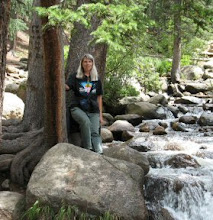Yesterday a catalog for "Great Courses" came into my hands, and it was pretty good reading. I'm even tempted to invest in some of their audio courses or DVDs, to tackle something I missed in college, like comparative religions or a history of European art. This isn't a program that shies away from tough topics: I could even learn the "neurological origins of individuality," or perhaps "how to listen to and understand great music."
But then I started looking for anything about Nature as naturalists seem to think of it, and came up short. There is, in a course called The Joy of Science (one of fifty in the category Science and Mathematics), one lecture on "Ecosystems and the Law of Unintended Consequences." At the risk of stating the obvious, perhaps getting acquainted with Nature isn't something we get—or can ever get—from school or from such media-based self-improvement opportunities.
Why not? Why couldn't a gifted teacher take us on a walk through an unfamiliar landscape and help us understand and appreciate it? Couldn't something of that field trip experience be captured in a video or DVD?
Dr. John Marr, great Rocky Mountain ecologist at the University of Colorado, used to take his students on field trips. Driving up the canyon west of Boulder, he'd drop a student off every mile or two, asking them to explore the surroundings in which they found themselves. As he picked them up on the return trip, each student got to "show-and-tell" what he or she had figured out. The discussions that followed surely enlightened all.*
Perhaps there truly is no substitute for the personal experience and exploration of nature, but it seems like a knowledgeable introduction could help us get on the path.
——
* This story came to me from one of Dr. Marr's students, Dr. Oakleigh Thorne, who has made "bringing nature to life for kids" a major part of his own life, through Thorne Ecological Institute.
Subscribe to:
Post Comments (Atom)

2 comments:
Nature study classes used to be a standard part of the public school curriculum in this country - Anna comstocks Handbook of Nature Study was one of the major textbooks. But sometime after WWII, I think, it was dropped in favor of more hard science. (Who wants to be soft, after all?)
The famous 19th-century zoologist Louis Agassiz admonished his students to "Study nature, not books." These words, somewhat paradoxically, are framed in the library of the Marine Biologocal Laboratory at Woods Hole, MA. We need books, but we will learn much more deply about Nature from wandeding in the woods than wandering in the library (or slinging DVDs for that matter).
Post a Comment